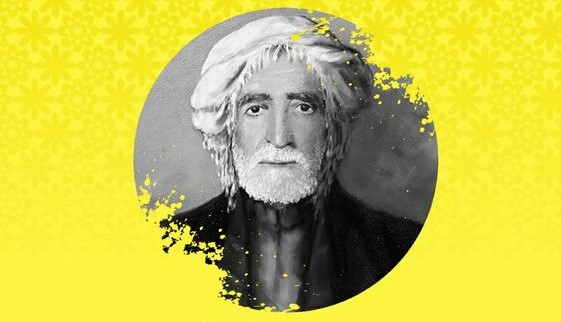"Seyyed Kamil Imami Zanbili" known as "Awat" is one of the professional poets and speakers of the East part of Kurdistan who had published his poems at the beginning of the twentieth century as a young poet with high linguistic and literature skills.
Awat was born in 1282 Hijri that is 120 years ago in "Zanbil" village near Bokan city in the Mukeryan region of the East part of Kurdistan. Awat was from the Sheikh family of Zanbil who were among the leaders of Qaderiyeh and Naqshbandieh Tariqats (two branches of Sufism). He finished his education in the mosque and Khanaqahs (a place where the Sufis perform their religious rituals) of the Mukriyan region with great teachers and Mullahs of that time, one of whom was "Haji Baba Sheikh". Haji Baba Sheikh, the prime minister of the Kurdistan Republic was Kamil's uncle. This is why the sense of patriotism was the essence of Awat's poems from the very beginning and during the most difficult circumstances, he resisted the corrupted government of "Mohammad Reza Pahlavi" and became one of the leading poets who represented the Kurdish social responsibility in the East part of Kurdistan and as he said himself in his autobiography: "From the very beginning of my life, I used my pen, writings, words, and weapon against the King and his government and in 1325 Hijri I got arrested by Pahlavi's agents and I got imprisoned for two years in Bokan, Mahabad, Saqqez, and Urmia jails".
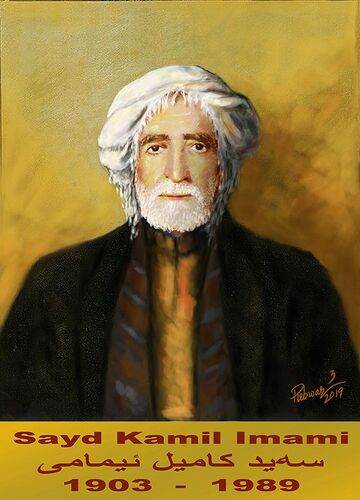
Seyyed Kamil Imami not only played a role in preserving the language and literature of Baban schools in the East part of Kurdistan as a poet, but he also had applied a pure form of the language with no foreign or non-original words in it. By doing so, he had taken a big step away from those poets who had applied a mixed language in their poems. Although, in some of his poems and even his language, it is clear that he was under Nali, Wafaei, and Mahwi's influence, in his descriptive poems about spring, he was one step ahead of those poets and promoted this kind of poem to a higher level. Especially, since Awat was a poet from the village so he knew every mountain, valley, and regions of Kurdistan and he also had seen all kinds of flowers, plants, and the spring secrets. Thus, he had presented a unique job in his poems that can be compared to the greatest poems' works.
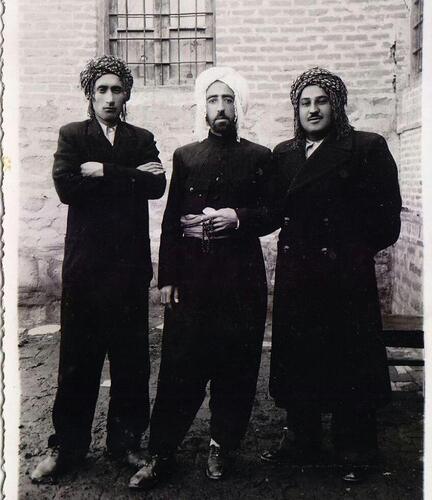
From the right: Ja'far Karimi, Seyyed Kamil Imami (Awat), and Karim Ahmadain, the prisoners in Urmia prison after the Kurdistan Republic got demolished at the end of 1326 Hijri.
On the other hand, Awat was ahead of his contemporary poets such as "Abbas Haqiqi" with whom Awat shared mutual thoughts and ideas, or in other words, Awat in comparison to his fellow poets such as Haqiqi had his own discourse and his particular intellectual position without getting separated from his society, and he had reflected his society's sufferings, pains and difficulties in his poems.
This sense of responsibility has moved even further in some of his poems in a way that he had reflected his society's problems in his poem as well as keeping his particular political discourse which had been displayed by the national movements. He wrote his works based on this discourse and had displayed his nation's political difficulties in his poems completely. At the same time, there were some poets whose works did not reflect the slightest aspects of these circumstances or since mentioning these difficulties and sufferings would create threatening situations for them, they simply avoided those topics.
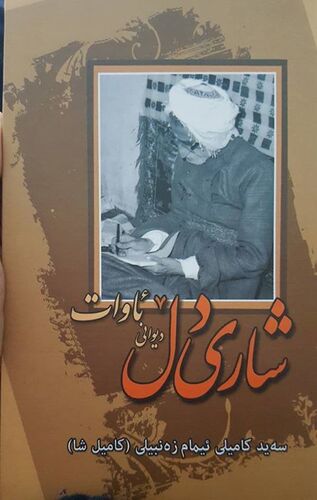
There are many such poems in Awat's Diwan. We will mention one of his best works here. One of the best poems of Seyyed Kamil is called "Shari Dil" (The City of the Heart), which is a work with a political background, and apart from the truth behind that political story, the poem itself shows a high level of intellectuality.
This poem was written during the dark days of Pahlavi’s authority when "The Democratic Party of Kurdistan of Iran" was collecting its members and leaders. As "Mullah Karim Sarda Kwestani" has mentioned in his book, Seyyed Kamil was a member and a fan of the Democratic Party and that is why he got invited to that meeting. This happened when Seyyed Kamil was living in the East part of Kurdistan while the meeting was being held in the South part of Kurdistan. Due to many reasons, Seyyed Kamil could not take part in that meeting and instead, he asked his son to take this poem to the meeting.
This is a poem in which sense and thought, emotion, and logic are debating. A fight that has always existed and it is still one of the most difficult ones that debates whether sense is overcoming the thought. Or is it the opposite? In this poem, Seyyed Kamil analyzes every aspect of sense and thought in an artistic way but the reader of this poem can see that although the poet made a decision based on his logic, he had a tendency towards his senses throughout the poem. That is, this poem is a play with two actors. One of them is "I" who is the poet himself, Awat, and the second one is "He", who is his logic and thought.
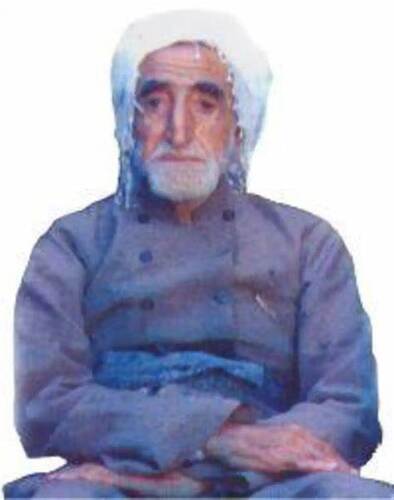
Throughout this poem, all the beautiful and poetic senses belong to "I", and all the doubtful, analyzed, and pathological decisions belong to "He". In other words, in this dialogue between the sense and the thought, the poet does not make a final decision in the poem and he stays in his doubts. Because, despite all the obstacles that his thought has made him, he lives with his nation and their sufferings with his senses and he refuses to leave them. Although at the end, the result of his decision is to stay put and not attend this national meeting which can cause thousands of problems for him, the reader still feels that the poem ended with a logical aspect. However, Awat keeps the balance by sending his work with his son to that meeting and this shows that he did not leave the sense. Revolutionary characters and lovers always see their senses prior to their personal safety and he was a lover of his nation and land and a revolutionary poet, too.
Part of "The City of Heart"
I say, the city of my heart is a garden and I will go there
My logic says, don't! It is the area where the drunks are revolting
I say, it is my soul's safe home
He says, don't! It is entirely burned to ashes

